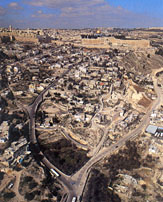
 |
|
|
|
|
|
|
|
|
|
|
|
|
|
| Home > History of Research > Tale of excavations > The City of David |
 |
Excavations in the City of David
The long history of Jerusalem and its role in the history of Judaism, Christianity and Islam, made it only natural that the first archaeological excavations in the Holy Land were conducted in Jerusalem. The early excavations on the southeastern hill were carried out long before this area had been identified as the location of the City of David. Indeed, archaeologists had justifiably suspected that this hill was the most ancient part of the city. Excavations, which were carried out at the site from 1867 to the middle of the 20th century, did not always meet the criteria of modern archaeological practice and scholarship. As a result, the ability to rely on the greater part of the findings and conclusions of the early scholars is limited, particularly concerning the dates they attributed to various findings. Excavations in the City of David, like elsewhere in the country, were conducted under four different regimes: the Ottoman (up to 1917), the British Mandate (1917-1948), the Jordanian (1948-1967) and the Israeli (since 1967). The attitudes of the varied authorities towards archaeological research differed considerably, and had a distinctive impact on the character of the research. |